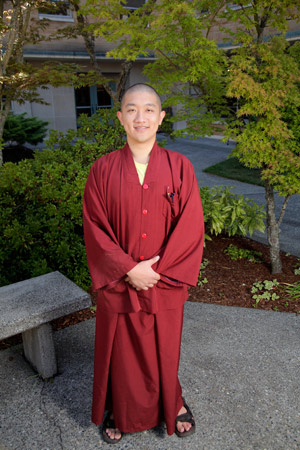Acupuncture and Buddhism Overlap for Student Monk
Published
There is an interesting parallel between Buddhism and medicine, says Yeeshen Tien. As a Buddhist monk and a student of traditional Chinese medicine, he would know.
In Buddhism, peace is not something one acquires. "It's unobtainable," says Tien. "It's unachievable, because it's always been there. We just have to learn to stop disturbing it."
The same is true for health, he says. We do not create or conjure it — we merely remove barriers and let it flow its natural course. Call it qi, the life force underlying traditional Chinese medicine. Call it the vis medicatrix naturae — the healing power of nature underlying naturopathic medicine. Call it simply wellness or well-being.
Tien has spent the last three years considering these connectionsas a student of acupuncture and Oriental medicine at Bastyr University. This fall, he will finish his program with a monthlong externship in China with classmates, training in hospitals with doctors practiced in both Eastern and Western medicine. Then he will return to his Bay Area monastery to start a clinic — a way to serve the school and temple that has become his home community.
Not every Bastyr student finds this level of clarity about career plans, although most share Tien’s eagerness to serve others.
“If all you think about is yourself,” he says, “all you have is yourself.”
A Mysterious Illness
 As a 13-year-old growing up with his family in San Bernardino County, California, Tien fell ill with headaches, nausea, vomiting and deep fatigue. A series of hospital visits and blood tests failed to diagnose the problem. Finally, he visited a traditional Chinese doctor in Texas who identified an unusual strain of salmonella poisoning.
As a 13-year-old growing up with his family in San Bernardino County, California, Tien fell ill with headaches, nausea, vomiting and deep fatigue. A series of hospital visits and blood tests failed to diagnose the problem. Finally, he visited a traditional Chinese doctor in Texas who identified an unusual strain of salmonella poisoning.
He offered tinctures and acupuncture, and Tien recovered. When his sister experienced a skin condition that doctors struggled to treat with steroids and laser therapies, she too found healing through the Texas doctor.
At 19, Tien began volunteering at the Purple Lotus Temple in San Bruno, California. Two years later he took vows and became a monk in the Vajrayana Tibetan tradition. He would dedicate himself to renouncing the desires that stood in the way of peace — a state that seemed to arise naturally, like health.
"That's why I became a monk," says Tien, now 27. "To see how that works."
He sits in Bastyr's campus courtyard on a sunny August morning, wearing the scarlet robes and shaved head that mark his dedication to a religious path. Several years ago, his grandmaster in California spoke to him about moving to Seattle to study acupuncture, a skill Tien could bring back to the temple. Tien was drawn to the idea, especially after his difficult experience in the conventional health care system.
"Natural practices seem to be more helpful in the long-term," Tien says. "It's actually curing something, instead of just treating the symptoms. You're looking at the whole body. In Chinese medicine, the acupuncture channels and organs are all connected. That makes sense to me. For my sister to treat her skin, she had to work on her intestines as well.
"With proper diet, she got better. Now her skin is like a baby's skin."
The Long Path of Learning
Tien enrolled in Bastyr's combined Bachelor of Science/Master of Science in Acupuncture and Oriental Medicine degree program. He quickly caught the attention of core faculty member Boonchai Apichai, MD (China), MS, LAc, who asked Tien to work as a teaching assistant.
"I love to have him in my classes because he's able to talk to students in a language they understand," says Dr. Apichai, who teaches tai chi, sports medicine and Chinese nutrition, among other subjects. "Teachers may not know what students are having a hard time with, but Yeeshen will understand, because he's a student too."
Tien offered extra tai chi training sessions and kept up with his own meditation practice to stay grounded during the school year. Many students practice meditation, says Dr. Apichai, but few as successfully or rigorously as Tien. He found a temple in nearby Redmond to support his spiritual life.
Like most students, he found his diet shaped by his education at Bastyr. He eats fewer foods discouraged by Chinese nutrition — dairy, and greasy, cold or raw foods. He's learned to balance the expectations of clinical training with his lifestyle. (Could he wear his robes in the clinic, which has a dress code? Yes, with closed-toe shoes.)
From the faculty at Bastyr Center for Natural Health, the University's teaching clinic, he learned the importance of listening carefully and communicating well with each patient. He recalls watching clinical faculty Hong Yu, DAOM, MD (China), LAc, take a patient's pulse at Bastyr Center.
"Do you have a new girlfriend?" Dr. Yu asked the patient.
He said he did. Dr. Yu talked about the emotional transition she sensed in his pulse.
Tien was amazed, he says. Someday, he hopes to reach that level of perception. For now, he looks forward to his next steps. More than anything, he's learned from his professors how much he still has to learn, he says.
"I've realized how long the path is ahead of me to really master this medicine and be able to teach people to help themselves," he says. "You can't make someone healthy. You have to master the skill of convincing them to change their habits."
----
Learn more about studying acupuncture and Oriental medicine at Bastyr.

